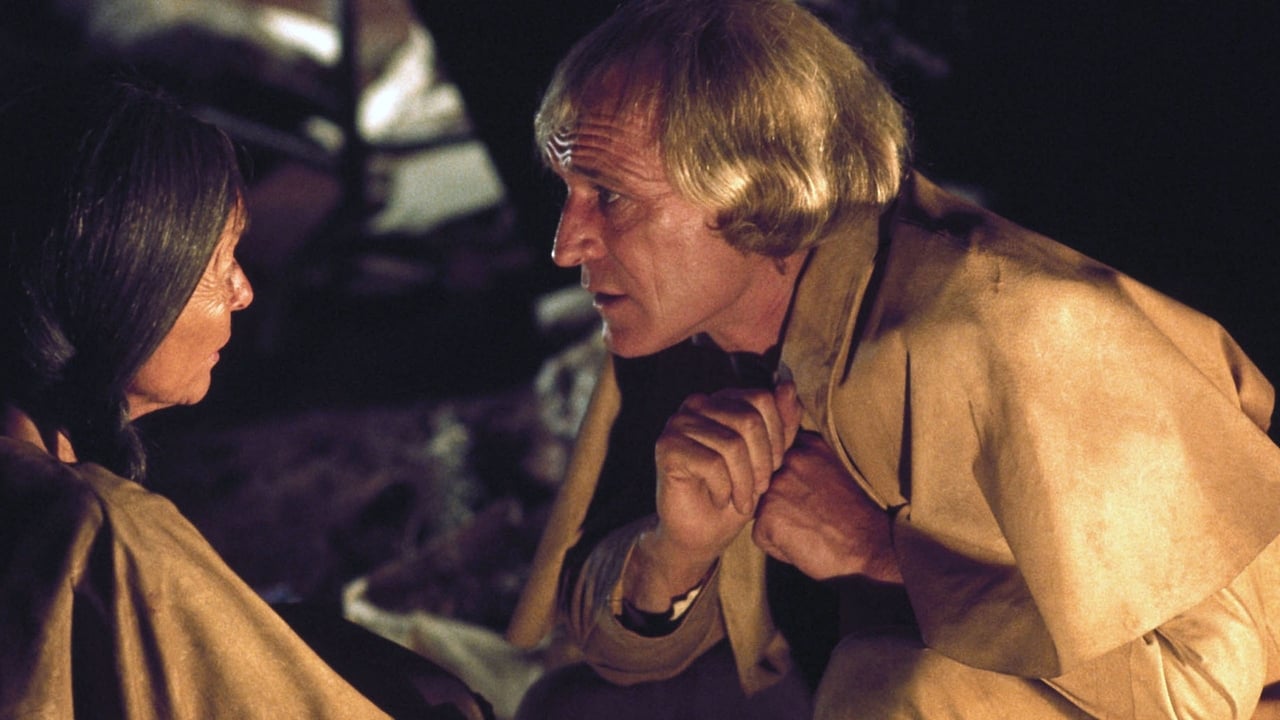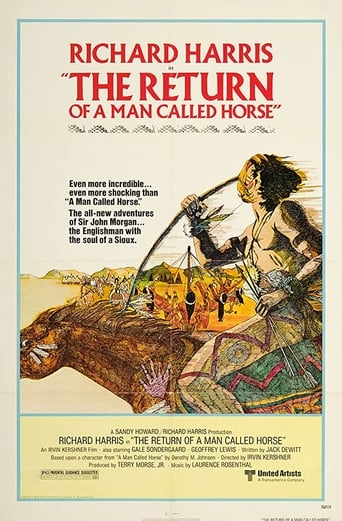Mjeteconer
Just perfect...
AutCuddly
Great movie! If you want to be entertained and have a few good laughs, see this movie. The music is also very good,
Whitech
It is not only a funny movie, but it allows a great amount of joy for anyone who watches it.
Phillipa
Strong acting helps the film overcome an uncertain premise and create characters that hold our attention absolutely.
gavin6942
The English gentleman known as Horse (Richard Harris), returns to the American west to save his adopted Indian tribe from extinction.According to Roger Ebert, "The film reveals its basic white-chauvinist bias, but it certainly seems to take itself seriously. It's of average length, but paced like an epic. There are four main movements in the plot: Return, Reconciliation, Revenge and Rebirth. If this seems a little thin for a two-hour movie, believe me, it is, even with all that portentous music trying to make it seem momentous." The film as a whole is not remarkable. Allegedly this is the film that convinced George Lucas to hire the director for "Empire Strikes Back", arguably the best of the "Star Wars" franchise. But this movie, I don't know... aside from the race issues (a white man intervening t save the Indians, and the Indians being played almost entirely by whooping, stereotypical white actors) it is just a bland movie. Even by sequel standards. Richard Harris is great, but he can't save this one.
ma-cortes
Enjoyable and entertaining sequel to ¨A man called Horse¨ . The English gentleman known as Horse, returns to the American west to save his adopted Indian tribe from extinction . As the Britisher aristocrat abandons his formal ways and returns the Sioux territory , in the Dakotas , and discovers again is own strength . As he passes their torture tests , and he is again embraced by the tribe . And again the ¨Sun Vow¨scene where our ex-aristocrat is suspended by horsehair ropes from bones inserted into holes made in his chest by eagle claws before they will accept him .This exciting picture packs thrills , chills , marvelous outdoors and more of the torture scenes for which this series is notorious . The picture contains a deep critical on the inevitable contempt that ignorance of different cultures engenders as well as anthropological differences . This is a very gripping and realistic portrayal of American Indian way of life . Interesting screenplay by Jack DeWitt who wrote also the original plot , based on a 1958 segment of the TV series ¨Wagon Train¨ 1957 , bearing the same title , The Man called Horse, it is the same story as this movie, with a few changes, even chief with two sisters, and a slave to Yellow Rope's mother . Furthermore , the story is based on Cabeza de Vaca's real life , a soldier from Spain that in 1528 suffered all that happens in this movie.Richard Harris is excellent , as always , at one of his mightiest box office hits . He is in terrific form as the Britisher nobleman who returns along with his Indians friends . Gale Sondergaard , replacing Judith Anderson , provides a strong acting . In addition , a fine support cast such as William Lucking , Geoffrey Lewis and Mexican actors as Jorge Luke , Claudio Brook , Enrique Lucero , all of them ordinaries in Indian roles . Rousing musical score by Laurence Rosenthal , in fact , director Irvin Kershner has said that of all his films, this one has the best soundtrack , as it plays like a small scale opera . Colorful as well as evocative cinematography by Owen Roizman , including impressive landscapes . The motion picture was very good directed by Irvin Kershner . On account of this film, which George Lucas found to be better than its predecessor , he hired Irvin Kershner to direct The empire strikes again .The original version ¨The man called Horse¨ is the best , starred by Harris , Judith Anderson , Iron Eyes Cody , Dub Taylor , James Gammon and directed by Elliot Silverstein ; it deals with Harris who fall into the clutches of a tribe of Sioux ¨Yellow Hands¨ Indians and they proceed to inflict torture by ritual ; it remains a riveting variation of ¨the man living wild¨ issue . Sequelled by a third part titled ¨The triumphs of a man called Horse¨ (1983) an inferior and inadequate following dealing with Horse's son who have to save his people from prospectors in order to keep his title as Chief ; being realized by John Hough with Michael Beck , Anna De Sade , Simon Andreu , but not much Richard Harris .
doug-balch
I never hear anyone refer to this as a quality movie. Only eight user reviews here. This is actually a good, entertaining movie that is being overlooked.Here's what I liked:The teepee village sets and the fort set had a very authentic feel to them. It's clear that very knowledgeable consultants were used to construct these sets.Richard Harris fills this role admirably. I found his character very believable. This is quite an accomplishment, since the basic plot is fundamentally implausible.Nice balance between the "good" Indians and "bad" Indians and "good" Whites (or "good White" as the case may be) and "bad" Whites. This prevented the movie from becoming over-melodramatic or maudlin.Excellent placement of the story in the vastly underused pre-Civil War trapper/mountain man historical period.Good location shooting. Nice shots of buffalo herds. Well filmed buffalo hunt.Effective mix of English, Sioux language and subtitles.Here's what kept it from being better:As mentioned above, the premise of the movie is fundamentally implausible. I give great credit to Richard Harris for making his character believable.It has a nice Indian point of view and mostly avoids high melodrama by presenting good and bad Indians. However its "Indian-friendliness" is undercut severely by two things: one, the use of many Caucasian actors in Indian roles and two, the supremacy of "Horse" as the White leader of the hapless Yellow Hand Indians.Geoffrey Lewis was a weak heavy. He didn't help "High Plains Drifter" much either in a similar role. Should have stuck with orangutan movies. Very weak supporting cast overall behind Harris.No comic relief.In the final battle scene, a dozen Yellow Hand squaws on foot with no rifles wipe out an equal number of opposing male warriors, who are armed with rifles and on horseback. Still trying to figure that one out.I fast forwarded through the sadistic pagan breast piercing/cleansing ritual or whatever it was. Gimmicky and gratuitous gore.One more thing. Did ALL the whites have to be massacred at the fort? Were they all murderers and rapists? Weren't there a few decent Joe's there just out trapping? Maybe a few guys just passing through who would have disapproved of the Yellow Hand massacre? Just sayin'.....
happipuppi13
As mentioned I watched both this and the classic original last night (03/27/08)back to back because my local library had both. In my review of "All Quiet On The Western Front",I stated that re-makes are hard to do,especially a TV movie version. TV sequels to theatrical films are just as difficult. The idea and story of John and/or Horse returning to seek solace and then fighting battles with his adopted tribe should have easily been,not just a great adventure but a film that makes some strong statement,like the original.Unfortunately,the constraints and pitfalls of TV make this difficult sometimes. One thing for sure in my view is the use of that "Little House On The Prarie"-like music in scenes. In the opening it's fine,he's returning to America and looking forward to seeing everyone again. When things get more serious & violent later,it really has no place here. This kind of story and this kind of music do not mesh very well. As for the actors playing Native-Americans,TV always did go for an easier route. I mean,this was the same medium that wanted us to believe John Travolta was 16 on "Welcome Back Kotter" when he was actually in his 20s. On the upside the movie,for 70s TV,is fairly daring and represents the times as they were then. What's really best about it,is that it concludes the true story of a unique man and character. It's just too bad it wasn't made for the cinema,with writers and directors and larger named actors. It could have given a much greater sense of urgency and compassion on our part as viewers. The first movie is really the only reason to watch this sequel,aside from the story of it's central character. Seven out of ten,2 points off for what it lacks and 1 more for that corny 70s TV music. (END)

